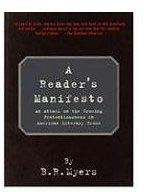This essay can also be found in the collection Writing Down the Dragon.
The journalist and historian Paul Johnson has divided all serious writers and critics into two camps, ‘intellectuals’ and ‘men of letters’. Intellectuals are those who, like Shelley, conceive themselves to be ‘the unacknowledged legislators of the world’; they are the Utopians, the revolutionists, the Angry Young Men; they involve themselves in politics, usually radical, readily form claques, and have a disturbing tendency to write manifestos. Men of letters (the term dates back to less literal-minded times, when ‘men’ could be understood to refer to both sexes) just read things, and write things, and write about what they read. They do not even have a strong tendency to read about what they write: the Platonically ideal man of letters is too comfortable in his ivory tower to care much about reviews and Press clippings. Karl Marx could well stand for the purest form of intellectual, and Emily Dickinson, if you will pardon the Irish bull, was a perfect man of letters.
Of course these extremes are only the endpoints of a continuous line, but most authors show a definite tendency to drift towards one end or the other. Tolstoy was an intellectual, and developed the points of that breed, so to speak, more and more strongly as he grew older, until he gave up imaginative writing altogether in favour of his own weird form of political messianism. Shakespeare was a man of letters, so very much so that it is still hotly disputed what his political opinions were, or whether he ever troubled to form any. Intellectuals have often been quick to dismiss men of letters as reactionary toadies or commercial hacks, and in fact Tolstoy attacked Shakespeare as both in his pamphlet, Shakespeare and the Drama. But for all the fame of both the attacker and the target, that pamphlet would be utterly forgotten today, had it not been preserved by George Orwell’s much more famous rebuttal, ‘Lear, Tolstoy and the Fool’. On the whole Orwell was an intellectual, but he had a very strong streak of the man of letters in him, and his sympathies were very much with Shakespeare.
In our own time, Michael Moorcock could well be described as an intellectual who sometimes masquerades as a man of letters. In The Way the Future Was, Frederik Pohl says that if the Futurians had conquered all of science-fiction fandom, the mere world would have been an anticlimax; and the same quality is distinctly present in Moorcock’s characteristic literary polemics. He takes literature as his battleground, but his weapons and his enmities are drawn from an almost purely political ideology. He seems very much concerned that Utopian writers shall write about the correct kind of Utopia, and his fury with dissenters knows no bounds. J.R.R. Tolkien, on the other hand, was so very much a man of letters that he did not even attempt to publish any of his fiction until a reader at Allen and Unwin chanced to hear of The Hobbit and pried the typescript out of his hands. And while Tolkien seems not to have heard of Moorcock any more than Shakespeare could have heard of Tolstoy, the same kind of bitter one-way enmity has grown between them.
I have before me an essay of Moorcock’s, called ‘Wit and Humour in Fantasy’, first published in 1979. It is ostensibly an argument for the natural and necessary alliance between humour and fantasy (something nobody ever remarked upon before Moorcock); but he makes his argument very badly, partly because it is poppycock, but chiefly because his real purpose is to attack his arch-enemy, Tolkien. In consequence it makes for interesting reading, and I would nominate it for a place of honour beside Shakespeare and the Drama in the canon of foolish diatribes.








Recent Comments